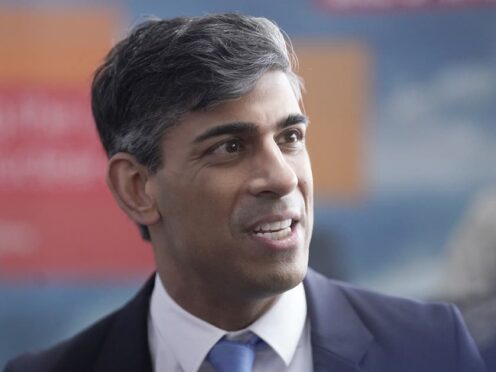
The UK is taking measures to protect itself from the “epoch-defining challenge” of an “increasingly assertive” China, the Prime Minister has said.
The Government is expected to say Beijing-linked hackers were behind a cyber attack on the Electoral Commission which exposed the personal data of 40 million voters, as well as 43 individuals including MPs and peers.
Speaking at an engineering firm in Barrow, Rishi Sunak would not be drawn on the expected announcement, but echoed the language used in the Government’s foreign policy review.
He said: “We’ve been very clear that the situation now is that China is behaving in an increasingly assertive way abroad, authoritarian at home and it represents an epoch-defining challenge, and also the greatest state-based threat to our economic security.
“So, it’s right that we take measures to protect ourselves, which is what we are doing.”
Efforts to step up pressure on China in response to the cyber attack include looking at sanctions on individuals thought to be connected with the alleged activity, according to multiple reports.
Deputy Prime Minister Oliver Dowden is expected to update MPs on the situation later on Monday.
Addressing the UK’s cyber defences, the Prime Minister said: “When it comes to cyber, we have the National Cyber Security Centre, which is world-leading.
“Indeed, when I’m out and about across the world, other leaders want to learn and talk to us because they believe that our capabilities in this country are very strong.”
The Electoral Commission attack was identified in October 2022 but the hackers had first been able to access the commission’s systems for more than a year, since August 2021.
Hostile actors were active in our systems and had access to servers which held our email, control systems, and copies of the electoral registers. We have since worked with external security experts and the National Cyber Security Centre to investigate and secure our systems.
— Electoral Commission (@ElectoralCommUK) August 8, 2023
The registers held at the time of the cyber attack include the name and address of anyone in the UK who was registered to vote between 2014 and 2022, as well as the names of those registered as overseas voters.
Nuclear minister Andrew Bowie said he could not comment on the speculation about China but told LBC Radio: “The fact is that this Government has invested a lot of time, money and effort in ensuring that our cybersecurity capabilities are at the place they need to be, we’ve increased the powers of our intelligence and security community to be able to deal with these threats.
“We will stop at nothing to ensure that the British people, our democracy, our freedom of speech and our way of life is defended.”
He insisted the Government took a pragmatic approach to dealing with Beijing amid reports China’s EVE Energy is set to invest in a battery plant in the West Midlands.
“We have to have a grown-up, pragmatic relationship with China. And that means looking at each of these investments in the round, on a case-by-case basis, ensuring that our security and our individual liberties and freedoms are not undermined by any of the investments that are under way.”
A small group of politicians who are hawkish on China were called to a briefing by Parliament’s director of security, Alison Giles, in relation to the activity.
They include former Tory leader Sir Iain Duncan Smith, former minister Tim Loughton, crossbench peer Lord Alton and SNP MP Stewart McDonald, the Sunday Times reported.
The four are members of the Inter-Parliamentary Alliance on China (IPAC) pressure group, which focuses on issues involving the increasingly assertive Asian power.
At a press conference in Westminster, Sir Iain declined to comment on the security briefing but said he hoped Mr Dowden’s forthcoming announcements would mark a “watershed” in relations with China.
Sir Iain said “we have been subjected to harassment, impersonation and attempted hacking from China for some time” but MPs would not be “bullied into silence by Beijing”.
He added: “We must now enter a new era of relations with China, dealing with the contemporary Chinese Communist Party as it really is, not as we would wish it to be.
“Today’s announcement should mark a watershed moment where the UK takes a stand for values of human rights and the international rules-based system on which we all depend.”
Meanwhile, reforms of UK spying laws continue to make their way through Parliament, with the Investigatory Powers (Amendment) Bill also in the Commons on Monday.
The legislation includes measures to make it easier for agencies to examine and retain bulk datasets, such as publicly-available online telephone records.

Enjoy the convenience of having The Sunday Post delivered as a digital ePaper straight to your smartphone, tablet or computer.
Subscribe for only £5.49 a month and enjoy all the benefits of the printed paper as a digital replica.
Subscribe